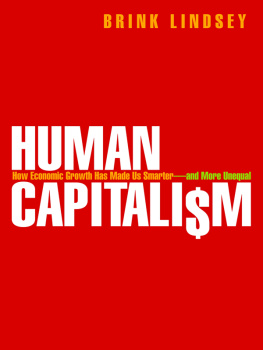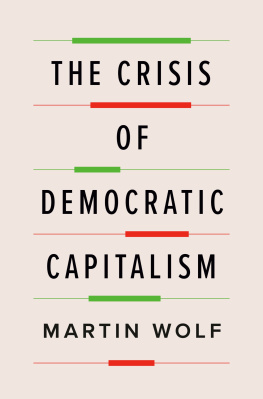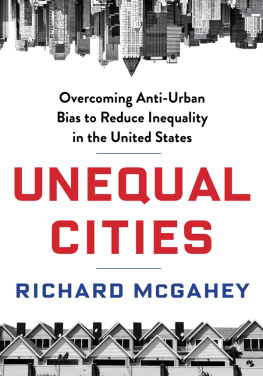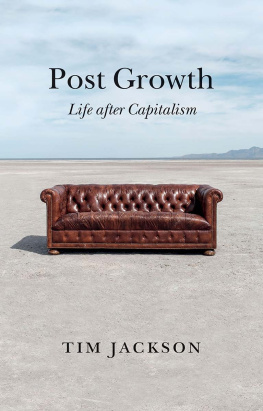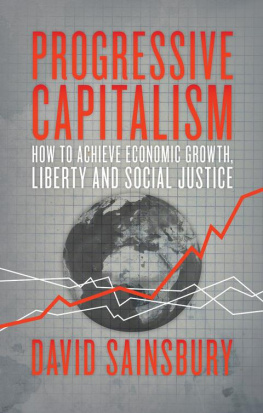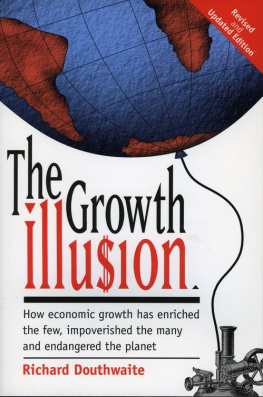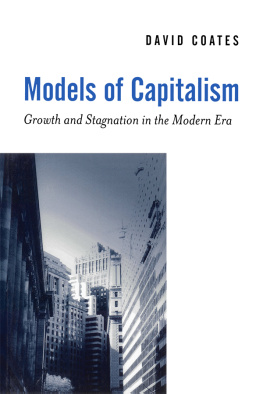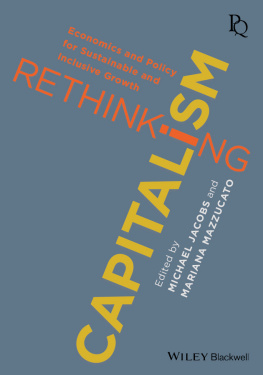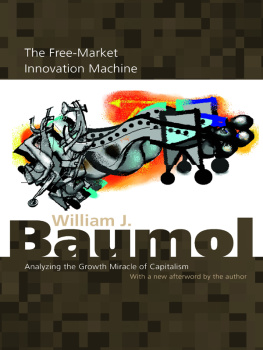Lindsey - Human capitalism: how economic growth has made us smarter - and more unequal
Here you can read online Lindsey - Human capitalism: how economic growth has made us smarter - and more unequal full text of the book (entire story) in english for free. Download pdf and epub, get meaning, cover and reviews about this ebook. City: Princeton, year: 2013, publisher: Princeton University Press, genre: Politics. Description of the work, (preface) as well as reviews are available. Best literature library LitArk.com created for fans of good reading and offers a wide selection of genres:
Romance novel
Science fiction
Adventure
Detective
Science
History
Home and family
Prose
Art
Politics
Computer
Non-fiction
Religion
Business
Children
Humor
Choose a favorite category and find really read worthwhile books. Enjoy immersion in the world of imagination, feel the emotions of the characters or learn something new for yourself, make an fascinating discovery.
Human capitalism: how economic growth has made us smarter - and more unequal: summary, description and annotation
We offer to read an annotation, description, summary or preface (depends on what the author of the book "Human capitalism: how economic growth has made us smarter - and more unequal" wrote himself). If you haven't found the necessary information about the book — write in the comments, we will try to find it.
Human capitalism: how economic growth has made us smarter - and more unequal — read online for free the complete book (whole text) full work
Below is the text of the book, divided by pages. System saving the place of the last page read, allows you to conveniently read the book "Human capitalism: how economic growth has made us smarter - and more unequal" online for free, without having to search again every time where you left off. Put a bookmark, and you can go to the page where you finished reading at any time.
Font size:
Interval:
Bookmark:

Human Capitalism
Brink Lindsey
Human Capitalism
How Economic Growth Has Made Us Smarterand More Unequal
PRINCETON UNIVERSITY PRESS
Princeton and Oxford
Copyright 2013 by Princeton University Press
Published by Princeton University Press, 41 William Street,
Princeton, New Jersey 08540
In the United Kingdom: Princeton University Press, 6 Oxford Street,
Woodstock, Oxfordshire OX20 1TW
press.princeton.edu
All Rights Reserved
Library of Congress Cataloging-in-Publication Data
Lindsey, Brink.
Human capitalism : how economic growth has made us smarter-and more unequal / Brink Lindsey.
pages cm
Includes bibliographical references and index.
ISBN 978-0-691-15732-0 (hardcover : alk. paper) 1. Economic developmentSocial aspects. 2. Cognition and cultureEconomic aspects. 3. Capitalism Social aspects. 4. EconomicsSociological aspects. I. Title.
HD75.L564 2013
330.12'2dc23
2013001637
British Library Cataloging-in-Publication Data is available
This book has been composed in Minion and Helvetica
Printed on acid-free paper.
Printed in the United States of America
10 9 8 7 6 5 4 3 2 1
Contents
Acknowledgments
First and foremost, I want to express deep gratitude to Bob Litan, my former colleague at the Kauffman Foundation, for believing in this book, giving me the time and freedom to write it, and offering guidance and useful feedback along the way. Thanks also to Seth Ditchik, my editor at Princeton University Press, for all his support and assistance. Eric Brynjolfsson, Bryan Caplan, Sallie James, Reihan Salam, Julian Sanchez, Dane Stangler, Steve Teles, Ben Wildavsky, and Scott Winship read drafts of the manuscript and offered incisive comments that greatly improved the final product. They are, of course, absolved from responsibility for all errors and shortcomings that remain.
Introduction
Things were so much simpler back then
If youve reached a certain ageyour forties? thirties? twenties?youve doubtless uttered this familiar, plaintive refrain at some point.
And you were right. Because the fact isand its an extremely important factour world is getting more and more complicated all the time.
There are many reasons, but economic growth is the biggest. Growth means a more far-flung, more intricate, more highly specialized division of labor. It means continued additions to the immense accumulation of knowledge and know-how dispersed throughout society. And it means proliferating choices along virtually every dimension of human existence. Put all that together and you get one of the defining characteristics of contemporary America: its overwhelming, incomprehensible complexity.
The rise in social complexity over the past century or sobasically, since industrialization took offhas produced Here, though, I want to look at the other side of the coin: not the effects of consuming great wealth, but the causes of our ability to produce it all.
In particular, I want to explore the strenuous mental demands placed on us by our increasingly complex social environment. To thrive and excel in the sensory and information overload of contemporary life, we have to use our brains in ways that set us apart from most people who came before us. We are rich today not simply because our superior technology and organization have made us more productive. Our minds have become more productive as well. Challenged to keep pace with the growing complexity of the world around us, we have stretched our cognitive capabilities far beyond the prevailing norms of times past.
So far, so good. The rise of complexity has been a mighty engine of human progressnot just in our possessions but in our abilities as well. By calling on us to develop our minds in novel and immensely fertile ways, it has broadened our horizons and summoned up powers we never knew we had.
But there is more to the story than that, for its obvious that not everybody is thriving and excelling in American society today. Despite the heaping riches that our economic system continues to pile up, millions remain trapped in a nightmare world of poverty, social exclusion, and despair. And many, many more struggle ambivalently with the fact that, despite enjoying steady gains in material comfort, their overall position in society seems increasingly marginal and insecure.
Why are the blessings of American life so unevenly distributed? Because of complexity, I will argue. It is my contention that, although things were very different in the relatively recent past, today the primary determinant of socioeconomic status is the ability to handle the mental demands of a complex social environment. If you can do that, youll likely have ample opportunities to find and pursue a career with interesting, challenging, and rewarding work. But if you cant, youll probably be relegated to a marginal role in the great social enterprisewhere, among other downsides, youll face a dramatically higher risk of falling into dysfunctional and self-destructive patterns of behavior. Complexity has opened a great divide between those who have mastered its requirements and those who havent.
To put this point another way, the main determinant of who succeeds and who gets left behind in American society today is possession of human capital. Human capital, of course, is the term economists use for commercially valuable knowledge and skills. It is widely understood that, in todays knowledge economy, the most important assets are not plant and equipment or stocks and bonds. Rather, the most important assets are the ones we carry around in our heads.
What is less well understood is why human capital has become so important, what has made its rapid accumulation possible, and how our social structure has been altered as a consequence. As I will explain in this book, the central importance of human capital in todays economy is a response to the rise of social complexity. Because it turns out that the most important forms of human capital consist of mental strategies for coping with complexityspecial skills that allow us to make sense of the blooming, buzzing confusion around us, form and sustain useful relationships in a world of anonymous strangers, and impose coherence on our unruly, conflicting impulses and desires.
At the core of this book, then, is a claim about the relationship between economic development and cognitive development. Heres the basic dynamic: economic growth breeds complexity, complexity imposes increasingly heavy demands on our mental capabilities, and people respond by making progressively greater investments in human capital. As a result, capitalism has morphed into human capitalisma social system in which status and achievement hinge largely on possessing the right knowledge and skills.
Over the past generation, though, the structure of American society under human capitalism has grown increasingly lopsided. And that is because the relationship between economic development and cognitive development has broken down for large sections of the population. For those in the upper third or so of the socioeconomic scale, the virtuous circle continues: increasing complexity has led to greater investments in human capital and widening opportunities for putting those investments to productive use. The rest of America, though, is being left behind: human capital levels are stagnating, and so are economic prospects.
This state of affairs is unstable. In any game where most of the players feel they are on the losing end, and where the players themselves have the power to rewrite the rules, sooner or later the pressure to change the rules will grow irresistible. For the game of human capitalism, the threat is that the rule changes will take the form of measures that undermine economic growthand thus rising complexity, and thus the potential for the further development of human capabilities and all the social progress that such development would make possible.
Next pageFont size:
Interval:
Bookmark:
Similar books «Human capitalism: how economic growth has made us smarter - and more unequal»
Look at similar books to Human capitalism: how economic growth has made us smarter - and more unequal. We have selected literature similar in name and meaning in the hope of providing readers with more options to find new, interesting, not yet read works.
Discussion, reviews of the book Human capitalism: how economic growth has made us smarter - and more unequal and just readers' own opinions. Leave your comments, write what you think about the work, its meaning or the main characters. Specify what exactly you liked and what you didn't like, and why you think so.

